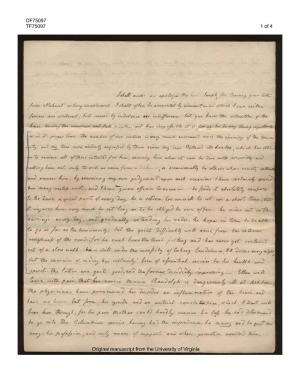Martha Jefferson Randolph to Joseph Coolidge
| Monticello Sept. 16 [1825] |
I shall make no apologies My dear Joseph, for leaving your letter from Nahant so long unanswered. I shall often be prevented by circumstances which I can neither foresee nor controul, but never by indolence or nor indifference. but you know the situation of the house during the summer and fall months, and how impossible it is for us to do any thing regularly or in it’s proper time. the number of our visitors is very much encreased since the opening of the University, and my time more entirely engrossed by them since My dear Father’s ill health, which has obliged me to recieve all of those intended for him, excusing him when it can be done with propriety, and calling him out only to such as come from a distance, or occasionally to others whose society interests and amuses him. by exercising my own judgement upon such occasions I have certainly spared him many useless visits, and I hope have given offense to no one—he finds it absolutely necessary to lie down a great part of every day. he is seldom too unwell to set up a short time, but it injures him very much to set long or to be obliged to rise often. he rides out in the carriage every day, and gradually extending his rides, he hopes in time to be able to go as far as the University, but the great difficulty will arise from the extreme roughness of the roads, for he cant bear the least jolting and has never yet ventured out of a slow walk. and he is still under the necessity of taking laudanum, 85 drops every night, but the exercise of riding has certainly been of essential service to his health and sprits. the latter are quite good, and the former decidedly improving—Ellen will learn with pain that her cousin Mann Randolph is dangerously ill at Ashton. the physicians have pronounced his disorder an inflammation of the brain and have no hope but from his youth and an untried constu constitution, which I trust will bear him through, for his poor Mother could hardly survive his loss. he had determined to go into the Columbian service having had the imprudence to marry and to quit our navy, his profession, and only means of support and where promotion awaited him.
Jane also has been very sick, a threat of the same kind, but she is rather better and Maria Carr quite well though still very weak. Cornelia will probably write to Ellen from Ashton where she is staying with poor Harriet and Mary, their Mother and other sisters being at Poplar forest —
Ellen has hardly had time yet “to know more than the faces” of those friends with whom her future life is to be spent. Of the Society of Boston I have heard but one opinion, and surely no one can better appreciate, nor do I know any one to whose happiness such society is more essentially necessary than to herself. but her warm affections have cast their “prestige” over the scenes and associates of her childhood, and time only can soften her regret and enable her to do full justice to others as fair, as good, as those she has left behind. your winters too she will find less terrible from the precautions you use against them, and from the steadiness of the cold to which one becomes inured—but the frequent changes in ours, render us more sensible to the cold and at the same time more careless in guarding against an evil which we consider of short duration. for that reason I have often heard Virginia spoken of as an uncomfortable winter residence, and that Monticello is proverbially uncomfortable so during that season Ellen can not already have forgotton—she will also find it much less trouble to “keep house” in town than in the country, and that your “helps” with all their faults, are neither as unmanageable nor as insolent as our slaves frequently are, her grand fathers for example. her a imagination by exaggerating evils in anticipation, has the good effect of finding her prepared preparing her for the reality, much lighter and easier to bear than she expected. in a late letter to Mary she introduced us to the comforts and elegancies of her own abode, from the “narrow entrance below” to the pleasant chambers above—how happy it would make me to occupy for a season the spare bed chamber. how simple and how natural to find my self at her bed side when indisposed, and occasionally to give you too My dear Son, a mother’s kiss at taking leave for the night. I shall often be with you in [. . .] imagination, and if I can ever have the good fortune to borrow “Tarare’s girdle” you may chance some bright sunny morning to see me walk in to breakfast. adieu tell My dear Ellen I will if possible write to her by the next mail and accept for your self dear Joseph, the warm and sincere love of your affectionate Mother
Mrs Cary, one of your new relatives begs to be affectionately presented to you as one who is extremely desirous of being better known to you, and also that you will take charge of her messages of love to Ellen. Jane is not with us but hourly expected—Nicholas is still at the springs much improved in his health. the girls all greet you with a sister’s love—
